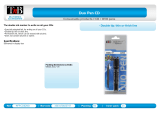
Page 3SKU 97750 For technical questions, please call 1-800-444-3353.
Unmodied plugs and matching out-
lets will reduce risk of electric shock.
Avoid body contact with grounded b.
surfaces such as pipes, radiators,
ranges and refrigerators. There is
an increased risk of electric shock if
your body is grounded.
Do not expose power tools to rain c.
or wet conditions. Water entering
a power tool will increase the risk of
electric shock.
Do not abuse the Power Cord (34). d.
Never use the Cord for carrying,
pulling or unplugging the power
tool. Keep Cord away from heat,
oil, sharp edges or moving parts.
Damaged or entangled Cords in-
crease the risk of electric shock.
When operating a power tool out-e.
doors, use an extension cord suit-
able for outdoor use. Use of a cord
suitable for outdoor use reduces the
risk of electric shock.
If operating a power tool in a damp f.
location is unavoidable, use a
Ground Fault Circuit Interrupter
(GFCI) protected supply. Use of
a GFCI reduces the risk of electric
shock.
Personal safety3.
Stay alert, watch what you are do-a.
ing and use common sense when
operating a power tool. Do not use
a power tool while you are tired
or under the inuence of drugs,
alcohol or medication. A moment
of inattention while operating power
tools may result in serious personal
injury.
Use safety equipment. Always b.
wear ANSI-approved safety impact
goggles and NIOSH-approved dust
mask/respirator. Safety equipment
such as non-skid safety shoes, hard
hat, or hearing protection used for
appropriate conditions will reduce
personal injuries.
Prevent unintentional starting. c.
Ensure the Power Switch (33) is in
the off-position before connecting
to the power source, picking up or
carrying the tool. Carrying power
tools with your nger on the Power
Switch or energizing power tools that
have the Power Switch on invites ac-
cidents.
Remove any adjusting key or d.
wrench before turning the power
tool on. A wrench or a key left at-
tached to a rotating part of the power
tool may result in personal injury.
Do not overreach. Keep proper e.
footing and balance at all times.
This enables better control of the
power tool in unexpected situations.
Dress properly. Do not wear loose f.
clothing or jewelry. Keep your
hair, clothing and gloves away
from moving parts. Loose clothes,
jewelry or long hair can be caught in
moving parts.
Power tool use and care4.
Do not force the power tool. Use a.
the correct power tool for your ap-
plication. The correct power tool will
do the job better and safer at the rate
for which it was designed.
Do not use the power tool if the b.
Power Switch (33) does not turn
it on and off. Any power tool that
cannot be controlled with the Power
Switch is dangerous and must be
repaired.


















